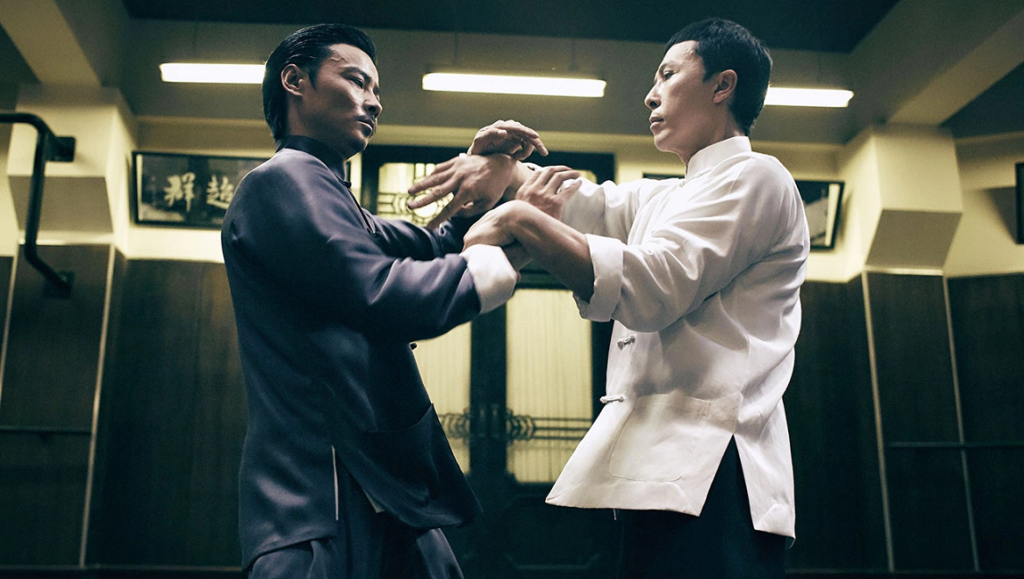The most admirable aspect of Wilson Yip’s Ip Man movies is their disinterest in typical biopic aspirations. Instead these films favor strong martial arts action and introspective melodrama. Previous installments have reduced the relationship between Ip and his most famous student, Bruce Lee, to little more than a cursory head-nod, marginalizing the grandmaster’s real life legacy in favor of a melange of superheroic ass-whoopings. In these films, Ip Man is much more than a teacher—he’s a warrior who has, on several occasions, saved China from foreign influence with little more than his fists and an unshakeable calm. Those established tendencies bear out once more in Ip Man 3, the apparent final chapter in the series—but when Yuen Woo-ping choreographs for the lightning-fast Donnie Yen, it’s hard to complain about the prioritization of action.
Still, Ip Man 3’s action serves too many masters, couching otherwise great setpieces within a confused mess of a narrative. Ostensibly, Ip Man is tasked with saving his son’s school from a gang of bandits operating under orders from Frank, a foreigner played by Mike Tyson. Meanwhile, the father of one of the school’s students reveals himself as a Wing Chun master in his own right, changes allegiances constantly and eventually challenges Ip for Wing Chun supremacy. This split focus in action is further complicated as Ip’s wife Cheung Wing-sing (Lynn Hung) contracts terminal cancer, creating a third major plot with precious little connection to the other two.
For the first time in the series though, Ip’s personal arc feels integral to its corresponding film, leading to scenes worthy of Yen and Hung’s chemistry and that are as worthwhile as the action. Yip’s meditation on death, particularly the loss of a loved one, provides some breathing room, with warm tones and wide frames favored as Ip and Wing-sing spend their last days together. Particularly potent is a typical family meal treated with intense care, presenting the mundanity that we’ve seen Ip skip time and again as suddenly of paramount importance in the wake of its impending demise.
With this third installment, Yip delivers the best action and most engaging emotional arc of the franchise
But for all their emotional honesty and affecting drama, these scenes are underserved by a film that just wants to get back to kung fu. After all, Ip Man 3 is so overstuffed with action that even if one were to cut Donnie Yen’s banner fight with Mike Tyson, it would hardly change a thing. The two fighters’ encounter is brief and turns what should be a climactic encounter into an excuse to tie up loose ends. And aside from marketing the film to Western audiences, Tyson is here only to loosely continue the ideological through-line of the first two movies, which position all Chinese conflict as a result of foreign influence. Tyson has very little screen-time and even less character to develop, but he acquits himself well in his one fight and serves his purpose as this film’s foreign puppeteer.
When the actual climactic battle arrives, it’s a relatively low-stakes affair: one for the title of Wing Chun grandmaster, fought between two men who previously worked together to save their sons from kidnappers. Like all the fights in Ip Man 3, it’s excellently choreographed; and Wilson Yip utilizes longer takes to accentuate the ability of his performers as often as he cuts for suspenseful dramatic effect. Outside the arena, Wing-sing sits and listens, for the last time, to the sounds of her husband fighting, a scene that finally melds the film’s action and romantic melodrama; at last Ip Man 3’s main attraction feels of a piece with its surprising emotional center. With this third installment, Yip delivers the best action and most engaging emotional arc of the franchise—but those parts tend to vie for the spotlight from each other, never quite coalescing until the very end.

